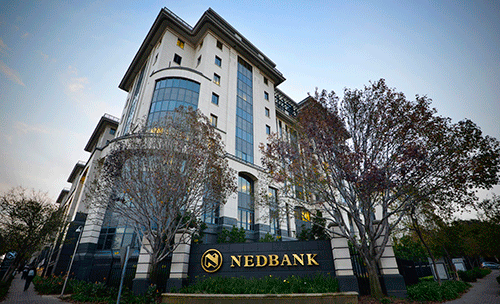Nedbank Group delivered a solid financial performance for the six months to 30 June 2023 as headline earnings (HE) increased by 10% to R7.3 billion in a challenging operating environment, whereas the return on equity (ROE) increased to 14.2% (H1 2022: 13.6%).
The increase in HE was underpinned by strong revenue growth, including associate income of 14% and good expense management, enabling pre-provisioning operating profit growth of 22%. This was partially offset by a 57% increase in the impairment charge, particularly in South Africa’s retail consumer banking segment.
According to Nedbank chief executive Mike Brown, the operating environment in the first half was much more challenging than initially forecast.
“In addition to a weak global economy and lower commodity prices, domestic
economic activity continued to be negatively impacted by very high levels of load-shedding, logistical constraints and higher-than-expected levels of inflation – and as a result, higher-than-expected increases in interest rates,” said Brown.
The group’s solid financial performance and strong balance sheet metrics enabled the group to declare an interim dividend of 871 cents per share, up by 11%, at a payout ratio of 57%.
Nedbank Africa Regions
Terence Sibiya, Nedbank Group managing executive, Nedbank Africa Regions (NAR), said, “I am incredibly pleased that the NAR cluster delivered a stellar performance achieved because of improved performances from the SADC operations and strong earnings from our Ecobank Transnational Incorporated (ETI) associate investment and the release of the R175 million Ghana domestic sovereign bond provision we took in 2022”.
The NAR business has operations in Eswatini, Lesotho, Mozambique, Namibia
and Zimbabwe as well as representative
offices in Ghana and Kenya.
Nedbank Group also has a 21.2% shareholding in ETI, which is a leading private pan-African banking group present in 35 sub-Saharan African countries in Francophone West Africa, Nigeria, Anglophone West Africa and Central, Eastern and Southern Africa.
“I am also happy that our ETI associate investment has continued to deliver an impressive performance. With the ongoing improvement in performance, ETI has declared dividends in the last two cycles. A new Group chief executive Jeremy Awori assumed full executive responsibility at ETI, effective 1 March 2023 – and as a banking veteran, his new leadership bodes well for the group’s future,” said Sibiya.
SA load-shedding
Meanwhile, record levels of electricity outages (load-shedding) in H1 2023 had a limited impact on Nedbank’s operations but it had a negative impact on the operations of many of the bank’s clients. This leads many clients to invest in renewable energy and private power generation solutions, providing a large financing opportunity for Nedbank.
“While it should never have happened, load-shedding has increasingly become a catalyst for renewable- and embedded-energy investments to support both SA’s Just Energy Transition, and for individuals and companies to reduce costs and reduce their dependency on electricity supply from Eskom. This is creating a strong runway for bank advance growth in this sector. However, electricity outages adversely impact business and consumer confidence, as well as increase inflation – and, as a result, limit gross domestic product (GDP) growth. From an SME perspective, load-shedding is making it increasingly difficult to start a business,” Brown said.
Nedbank stated that from a credit quality perspective, the negative impact of load-shedding has been more evident in small-business and commercial-business segments, with clients in various industries being especially impacted to various degrees.
These industries include agriculture, manufacturing, restaurants, food services, retail (supply chain) and tourism.
Some of these industries incurred operational losses (such as the impact of products perishing and stoppages in production lines) while at the same time absorbing increasing levels of operational costs (such as for the use of generators).
Corporate clients, in general, are more resilient, given their strong balance sheets after having deleveraged post-Covid-19, but Nedbank stated it continues to monitor the impact on clients who may be more impacted.
“The shortage of electricity supply – hence very high levels of load-shedding – is currently the most material constraint on GDP growth. Urgent and decisive action is required by government, labour, civil society and business to unlock SA’s undoubted economic potential and ensure higher levels of sustainable and inclusive economic growth,” Brown said.
Outlook
Nedbank currently expects the economic environment in SA to remain very challenging, particularly given the high levels of electricity shortages and increased levels of pressure on consumers’ disposable income as a result of higher levels of inflation and interest rates.
The Nedbank Group Economic Unit currently forecasts SA’s GDP to increase by only 0.3% in 2023 and interest rates to remain at elevated levels, with the repo rate at 8.25% and the prime lending rate at 11.75% for the remainder of the year.
The International Monetary Fund (IMF) expects sub-Saharan Africa to grow by a softer 3.5% in 2023, down from 3.9% in 2022, before accelerating to 4.1% in 2024.
With considerable uncertainty
surrounding the outlook for world growth, inflation and interest rates, global risk appetites and markets are likely to remain volatile, and conditions in the banking industry are likely to remain challenging.
We continue to monitor the socio-political situations in Eswatini, Mozambique and Zimbabwe (elections this month) for their potential impact on their economies and growth.
Responsive management action plans are in place to deal with Zimbabwe’s hyperinflationary environment and macroeconomic policy uncertainties
“The solid financial performance in H1 2023 supports our ambition of achieving our published 2023 targets of an ROE greater than the 2019 ROE level of 15% and a cost-to-income ratio of below 54%, but the deteriorating macroeconomic environment has made these and our medium-term targets to 2025 more difficult to achieve.
Pleasingly, in 2022, we had already achieved our 2023 target of exceeding the group’s 2019 diluted headline earnings per share of 2 565, and we aim to maintain our current #1 ranking on Net Promoter Score among South African banks,” Brown said.



